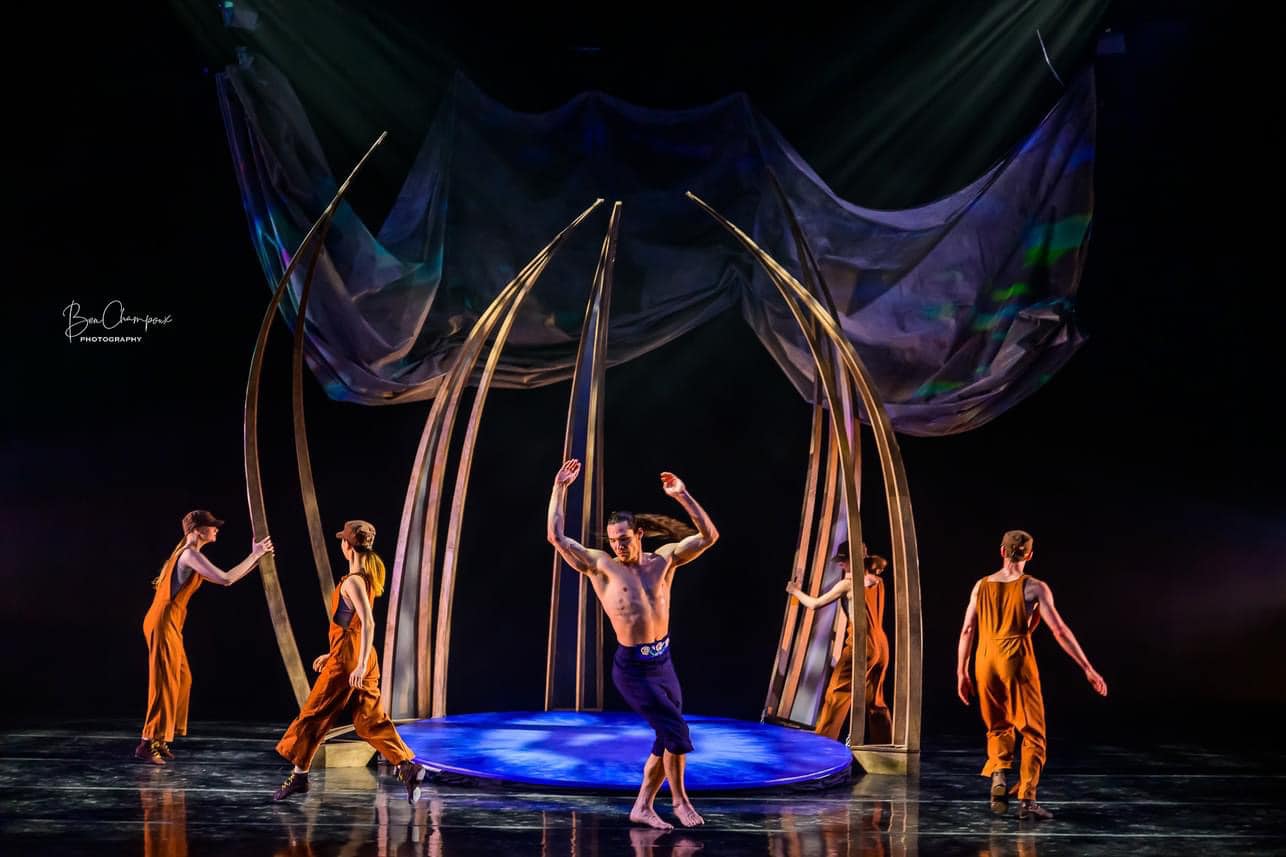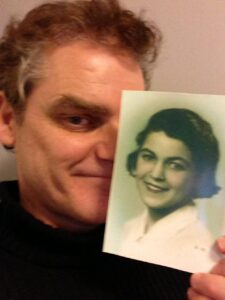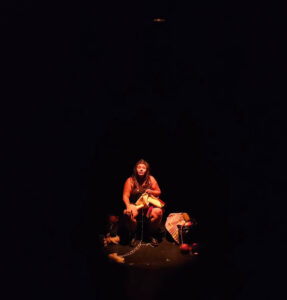
Pisuwin. Photo by: Ben Champoux Photography
Atlantic Ballet’s production of Pisuwin, which played for one night only at the Spatz Theatre last week as part of the Prismatic Arts Festival, was one of the most visually powerful performances I have ever seen.
The ballet was co-created by Igor Dobrovolski, the Artistic Director of Atlantic Ballet, one of Canada’s most prolific choreographers, and Nipahtuwet Naka Wespahtuwet (Possesom) Paul, a Wolastoqiyik multidisciplinary artist, and it is based on a Wolastoq tale. The ballet uses the music of Jeremy Dutcher, a Juno and Polaris Prize winning composer and musician, who is also a Wolastoqiyik artist.
The story is centred on the idea that greed and alienation makes the entire world unbalanced and diseased, as told through the Wolastoq people’s connection to Spirit. Sib is the water, and she gives life to Olomi. The two are bound together in their interdependence and love for one another using the imagery of a rope that connects them. Machant, a greed monster, wants to consume Sib for its own power, and this creates a world of fear and emptiness for Olomi. Olomi is then thrust into the Industrial world where they try to keep their head down and learn how to survive in this new way, but it only makes them more isolated, lonely, sick, and sad. In order to find their way back to healthy balance, Olomi will have to defeat Machant.
Machant visually looks similar to a Plague Doctor, which roots them in imagery of disease and pestilence, and reminds us of how the early settlers of what is now Nova Scotia and New Brunswick spread disease to Wolastoq and Mi’kmaq communities, which led to mass suffering and death. In the program the ballet is described as reflecting on the “current state of dis-ease in our world,” which clearly and beautifully links the problems we see today in our societies, which in many cases cannot be rooted in relationship with the land because of the way they have been structured and embedded in capitalism, with the ways that the European settlers first brought many of these same issues to Turtle Island for the first time when they arrived in the 16th and early 17th Centuries.
The dance is rooted very much in ballet, and the movements tell a clear and deeply moving story that is easy to understand in general terms even without reading the scene by scene synopsis in the program. However, it also feels very much of this time, and this place, divorced, or liberated, in a way from the more formalized and traditional European ballets, which can seem more like museum pieces sometimes. Pisuwin is immediate: and while it is told in the Wolastoqiyik language, which goes back millennia, it is as much about reclaiming and bringing the language into the present and the future as it is about honouring the past.
Jeremy Dutcher’s music, as well, is a mixture of styles, similar to the ballet itself. According to Wikipedia Dutcher’s first album Wolastoqiyik Lintuwakonawa is a “post-classical rearrangement of traditional First Nations music.” The way Dutcher performs these songs is unique as he is a classically trained tenor, trained in the Western Opera tradition. Finding a way to balance the Western with the Indigenous, and figuring out how to make a blend that honours and doesn’t diminish, or feel colonial, is, I’m sure, a delicate balance, but finding it can be really beautiful and can show us all a respectful way forward, together, on this land is possible.
There are eight dancers in the piece and they are all exceptional. Eldiyar Daniyarov, Stéphanie Audet, Thomas Finnigan-Badrock, Laura Flydorf, Nozomi Nakabayashi, Olga Petiteau, and Hiroto Yamaguchi make up the ensemble and are a mixture of Canadian dancers, and those from various international countries. The principal dancer is Métis choreographer and performer Jera Wolfe from Tkaronto (Toronto), and he gives such a gorgeous performance as Olomi, someone who tries to assimilate into their new world in attempt to survive, but who eventually finds the strength and empowerment to fight back against the monster.
Whether you know a lot about ballet or you have never been to one before, I definitely recommend seeing Pisuwin. It had me crying and cheering at the end, and feeling absolutely triumphant and hopeful that we too can find a healthier path to a future that restores so much of the goodness and vitality that greed, disease, and selfishness has stolen from the land here.
Pisuwin is on tour right now through Atlantic Canada, coming to venues in Newfoundland, Prince Edward Island, and New Brunswick. Here are the cities and dates for the tour:
Newfoundland
- Stephenville October 13th
- Corner Brook October 15th
- Grand Falls-Windsor October 18th
- Gander October 20th
- St. John’s October 23rd
Prince Edward Island
- Charlottetown October 28th
New Brunswick
- Fredericton November 1
- Moncton November 28
For more information please visit this website. Jeremy Dutcher’s album is available at his website, and wherever else you get your music. You can find Atlantic Ballet on Facebook and YouTube. You can find Jeremy Dutcher on Facebook, YouTube, and Instagram.







1 thought on “Pisuwin is a Triumph”
Comments are closed.